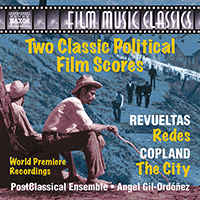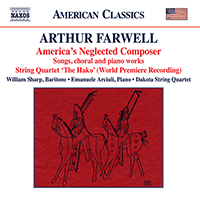
Every once in a while a review comes along that eloquently affirms the convictions inspiring a book or recording – even though the convictions in question may not be widely known or held.
I’m thinking — gratefully — of two Naxos CDs I’ve recently produced, as received by Nestor Castiglione in Music Web International and by Curt Cacioppo in the same publication as well as via his own blog. The music is by Silvestre Revueltas and Arthur Farwell — composers I extol as part of my “new paradigm” for American classical music in Dvorak’s Prophecy.
Revueltas’s Redes is (alas) not an especially famous film score – but it’s one of the most galvanizing ever composed. Reviewing the new Naxos world premiere recording of the complete Redes music, performed by Angel Gil-Ordonez and PostClassical Ensemble, Castiglione writes:
“It is as welcome a revelation as can be hoped, permitting the listener to finally grasp the unfettered breadth of Revueltas’s genius. Like Sergei Prokofiev, Dmitri Shostakovich, and Bernard Herrmann, Revueltas crafted evocative music that not only blended with and augmented on-screen action, but managed to create its own self-sustaining logic and structure . . . a dazzling symphonic fresco that displays Revueltas’s imagination in full flight.”
Contrasting Revueltas with Aaron Copland, whose music for The City is recorded on the same disk, Castiglione observes:
“The Mexican was intuitive, earthy, and intemperate, the last trait contributing directly to his tragically short life and even shorter creative career. The American, on the other hand, was calculating, urbane, and restrained. Where they coincided was in their sympathy for the political left, each taking up pen and score paper to agitate for what they believed to be a better tomorrow, and in their shared appreciation of the emerging importance of cinema in helping to convey their message to a mass audience.”

Cacioppo’s reviews are of Arthur Farwell’s Hako String Quartet – also a world premiere Naxos recording, with the Dakota String Quartet:
“In his Op. 65, Farwell surpasses all previous efforts, including his own, at attempting . . . cross-cultural coalescence. The process and result seem sui generis until we encounter, a generation later, a Native composer who conversely embraced Western musical tradition: Louis Ballard (1931-2007). Ballard, part Quapaw and part Cherokee, was descended from chiefs on both sides of his family, and grew up learning the cultural practices of his people. At the same time, he pursued a musical path of study at the University of Tulsa with Béla Rózsa, and a career that took him to New York City and the celebrated capitals of Europe. Louis felt himself at once an avowed post-Schoenbergian and thoroughly Indian. Ultimately he said, pointing to one of his scores, ‘This is not Native American music or any type of music other than “Louis Ballard music.”’ Now that we are finally able to hear and take measure of Farwell’s Hako quartet, and reflect upon its genesis and intent, it becomes clear what exact counterparts he and Ballard are in historical relation to each other, each searching for synthesis, each writing his music, each shining a light toward compositional advancement. The parallel conjures up the Hopi twins at the North and South poles, who keep the planet rotating. Each composer takes the cultural inheritance bequeathed and entrusted to him and pools it with resources of the other in an effort to define his individual artistic identity, consequently widening and enriching the art.”
In fact, all the music here – Revueltas’s Redes, dignifying rural fishermen ensnared in a punitive market economy, Copland’s The City, proselytizing for a workers’ paradise, Farwell’s Hako, celebrating Native wisdom – seeks to “widen and enrich.”
Here’s a pertinent film: Redes Lives!
Here’s a pertinent National Public Radio documentary on “Mexico’s most famous unknown composer.”
Here’s a pertinent film about Copland, populism, and the Red Scare.

a tribute to wonderful work, your explorations of cultural heritage are expanding our ears